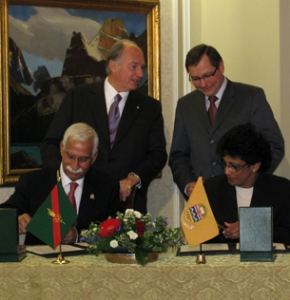Aga Khan University, University of Alberta expand partnership - 2009-06-09
June 9, 2009 - Edmonton--The University of Alberta and the Aga Khan University today signed a memorandum of understanding that advances their respective goals to increase global engagement and to promote equitable human advancement and social justice throughout the world.
The agreement was signed at Government House by University of Alberta President Indira Samarasekera and Aga Khan University President Firoz Rasul in the presence of Alberta Premier Ed Stelmach, and His Highness the Aga Khan, spiritual leader of the Shia Ismaili Muslims, and founder and chairman of the Aga Khan Development Network.
"The expansion of this partnership puts the University of Alberta on the forefront of international capacity building," said Stelmach at the signing ceremony. "AKDN's extensive reputation in economic, social and cultural development allows the university to harness Alberta's research and teaching innovation to benefit communities not only in Alberta, but also in East Africa, and Central and South Asia."
The agreement expands on an existing relationship between the two universities and includes two additional agencies of the Aga Khan Development Network: the University of Central Asia and the Aga Khan Trust for Culture.
"The University of Alberta, along with the Aga Khan Development Network, is deeply committed to providing globally engaged higher education and research," said Samarasekera. "Through our partnership, the university will move much closer to fulfilling one of our most important goals-to reach out to the developing world in Africa, the Middle East and parts of Asia, and engage in meaningful and effective dialogue and exchange."
Areas identified for immediate collaboration include health sciences education, humanities development and library planning, biodiversity conservation and sustainable land use programs with particular emphasis on mountain environments and semi-arid regions with the University of Central Asia.
"This partnership will enable the University of Alberta's expertise to impact parts of the world that would not otherwise benefit from these capabilities," stated Rasul. "Their innovative approach to research, teaching and service in healthcare, education, and sustainable economic and environmental development in northern Canadian communities could greatly benefit the developing countries in which AKU, UCA and the Aga Khan Trust for Culture currently work."
The deepened partnership will also facilitate the participation of the U of A in the development of the Undergraduate Medical Education Programme in East Africa and will build on previous successes to move beyond health care and the health sciences into areas that will benefit the larger AKDN vision.
The collaboration between the two universities builds on an initial agreement signed in June 2006 on academic and scientific cooperation together with Alberta Health Services. As a result of that agreement, faculty and staff from the AKU School of Nursing and the Aga Khan University Hospital in Nairobi, Kenya, have recently completed graduate programs and training at the U of A in areas such as interventional cardiology, breast conservation surgery and physiotherapy.
Over the past 25 years, the Aga Khan University has fostered partnerships with several universities in Canada and across the world including McMaster, the University of Waterloo, University of Toronto, Harvard University and Oxford University. Based on common values and approaches to sustainable development, these partnerships have improved the quality of curriculum development and teaching standards at AKU and raised the profile of professions such as nursing and teaching in the developing world, giving students the impetus to enter these desperately needed careers. Students and faculty from partner institutions have further benefited through professional exchanges, joint research projects and teaching opportunities.
"Partnerships, such as this one, build capacity in the developing world where it is needed most, but more importantly, they build compassion and understanding across our interconnected world. By expanding this partnership to other AKDN agencies, we hope to spread the benefits further afield," said Rasul.
- 6520 reads
 Ismaili.NET - Heritage F.I.E.L.D.
Ismaili.NET - Heritage F.I.E.L.D.